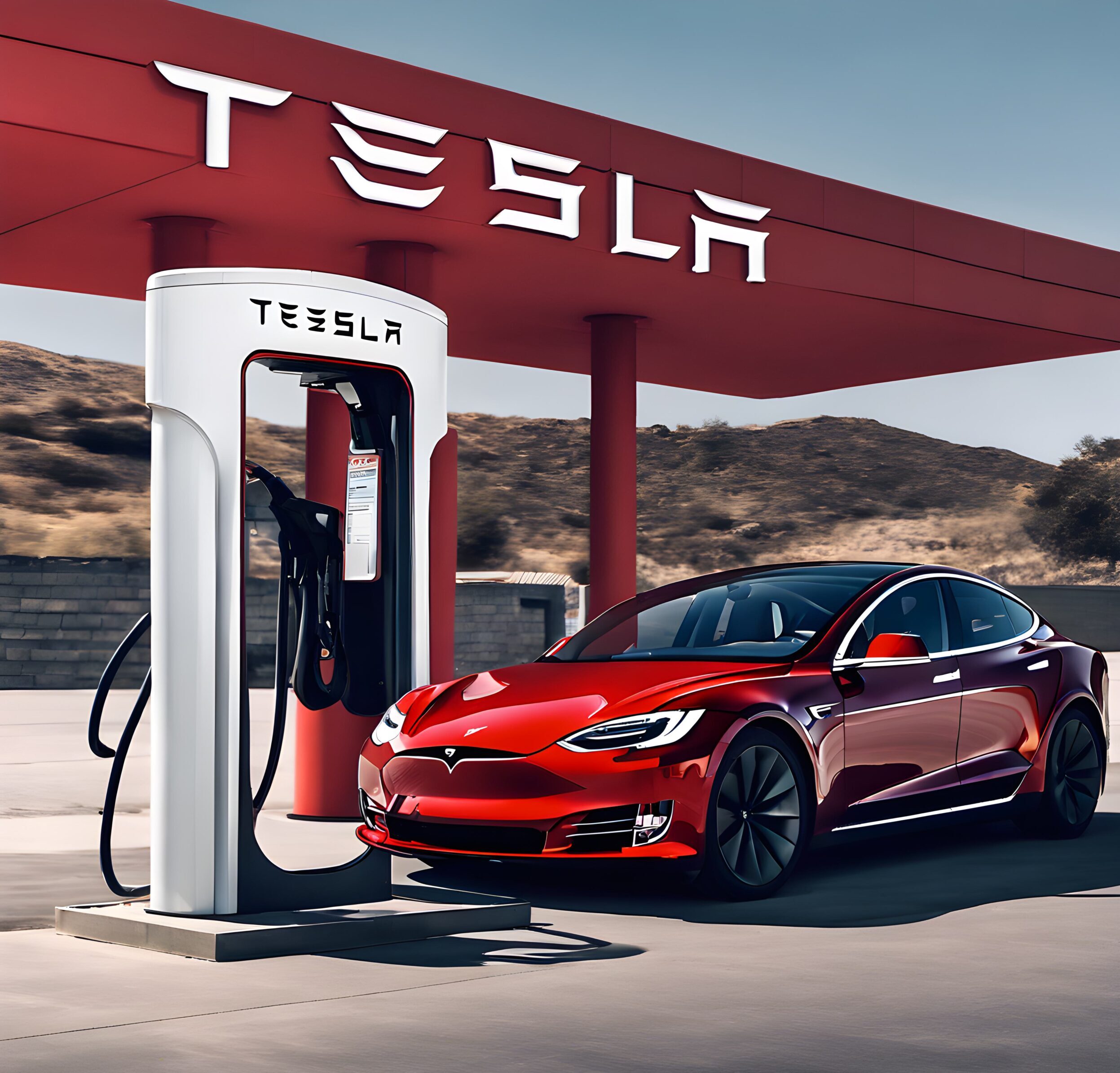
Tesla’s Impact on the Stock Market
In recent weeks, Tesla (TSLA) has become a focal point of market discussions, with its stock seeing a notable surge of over 6%. This increase in Tesla’s market valuation has not only strengthened its position within the electric vehicle (EV) industry but also influenced broader market indices, particularly the Nasdaq 100. Investors and analysts alike have taken note of the factors contributing to Tesla’s growth, including favorable regulatory shifts and the company’s advancements in autonomous driving technology.
Tesla’s performance is significant for the stock market as a whole, especially as it plays a central role in the EV sector. Tesla’s movements often serve as a bellwether for market sentiment surrounding new technologies and industries like autonomous driving and green energy. As the EV market continues to grow, Tesla remains one of the most scrutinized and influential companies in the space. In this article, we will explore the reasons behind Tesla’s recent surge and its broader impact on the stock market.
Tesla’s Stock Surge: A Deep Dive
Tesla’s recent 6% surge has grabbed headlines in the financial world, and for good reason. The company’s stock has experienced a significant rally, largely attributed to factors like increased vehicle deliveries, strong earnings reports, and investor optimism surrounding its plans for autonomous vehicles. This surge has played a central role in boosting the broader markets, particularly the tech-heavy Nasdaq.
The Numbers: A Closer Look at Tesla’s Stock Performance
Tesla’s stock price has consistently outperformed many expectations in recent months, and its latest jump is no exception. The 6% increase in Tesla’s stock is part of a broader trend of recovery for the electric vehicle giant, which had faced some volatility earlier in 2024. According to reports, Tesla’s market capitalization has now surged, with analysts predicting further gains if the company continues to meet or exceed delivery expectations.
Tesla’s stock movement has become one of the most closely watched in the stock market, and it has a significant impact on indices like the Nasdaq. As one of the leading players in the EV market, Tesla’s performance is a key indicator of broader market trends in the technology sector.
Investor Sentiment: Riding High on Autonomous Vehicles
Tesla’s rise has also been driven by investor sentiment. With the company making significant strides in autonomous driving technologies, investors are betting on Tesla’s ability to lead the charge in the future of self-driving cars. These developments have bolstered Tesla’s reputation as an innovative leader, attracting both short- and long-term investors who believe in the company’s ability to reshape the automotive landscape.
Impact on Broader Markets: Nasdaq and Beyond
Tesla’s 6% surge has had a ripple effect on broader stock markets. In particular, the Nasdaq 100 has benefited from the gains, as Tesla is a major player within this index. When Tesla performs well, the Nasdaq often reflects that success, as other tech stocks in the sector tend to follow suit.
Nasdaq’s Performance and Broader Market Trends
The Nasdaq 100 index, which includes some of the largest and most influential tech companies in the world, saw notable gains as Tesla’s stock surged. The correlation between Tesla’s stock performance and the overall Nasdaq is evident, as both are heavily influenced by investor sentiment toward technology and innovation. This upward movement has had a ripple effect, lifting other stocks in the EV and tech sectors.
It’s not just Tesla’s own performance that influences market trends, but also the broader implications of its success. As Tesla continues to innovate in the fields of clean energy, EV technology, and autonomous driving, the company’s stock rise signals optimism for the entire tech sector. Analysts are predicting that Tesla’s market dominance could continue to drive these trends in the coming years.
The Role of EV and Clean Energy Stocks
In addition to Tesla, other companies within the clean energy and EV space have also benefited from the positive market conditions. Companies like Lucid Motors, Rivian, and Fisker have seen some upward movement, driven in part by the heightened investor interest in electric vehicles. Tesla’s strong performance has also given a lift to these competitors, as the sector as a whole is expected to experience continued growth.
Tesla and the Regulatory Environment
Tesla’s growth is not only a product of market forces but also of favorable regulatory changes. The incoming Trump administration’s focus on deregulating the autonomous vehicle sector is seen as a significant boon for Tesla. With advancements in self-driving technology central to Tesla’s future, any reduction in regulatory hurdles is welcomed by investors.
Trump’s Regulatory Impact on Tesla’s Future
Recent reports have suggested that the Trump administration is preparing to roll back some regulations surrounding autonomous vehicles, potentially creating a more favorable environment for companies like Tesla that are leading the charge in self-driving technologies. Tesla CEO Elon Musk has been an outspoken supporter of such deregulation, arguing that fewer barriers to innovation could accelerate the development of self-driving cars.
Tesla stands to benefit greatly from these regulatory changes. The company’s advancements in autonomous driving are central to its long-term growth strategy, and any loosening of restrictions could open the door for faster deployment of self-driving vehicles across the country. This would not only give Tesla a competitive edge but could also provide a significant boost to its stock price in the future.
Long-Term Growth Prospects for Tesla Under Trump’s Policies
The potential regulatory shift could have long-term implications for Tesla. By reducing barriers to the development of autonomous vehicles, the Trump administration’s policies could enable Tesla to accelerate the rollout of its self-driving cars and software. As Tesla’s ability to lead in this field becomes more apparent, investors may respond positively, driving up the stock price even further.
Tesla’s Autonomous Driving Technology: The Game Changer
Tesla’s push into autonomous driving technology is a key element of its strategy to maintain dominance in the EV market. The company has already made significant strides in developing self-driving technology, and its efforts in this area are often cited as a major factor in the recent surge in its stock price.
Advancements in Autonomous Driving
Tesla’s latest developments in autonomous driving technology are nothing short of groundbreaking. The company has continually improved its Full Self-Driving (FSD) software, which is now available to a growing number of Tesla vehicles on the road. The advancements in Tesla’s FSD capabilities have positioned the company as a leader in the race toward fully autonomous vehicles.
In addition to the software, Tesla has also focused on improving the hardware used in its vehicles, including the cameras and sensors that power the self-driving system. These improvements make Tesla’s vehicles some of the most advanced on the market, further enhancing the company’s reputation as an innovator in the automotive space.
How Autonomous Vehicles Will Affect Tesla’s Stock
Tesla’s advancements in autonomous driving have a direct impact on its stock price. As investors see the company making progress in this area, their confidence in Tesla’s future grows. The belief that Tesla is leading the way in autonomous vehicles has fueled much of the optimism surrounding the stock. With the company’s self-driving technology improving rapidly, investors are betting on the long-term growth potential of Tesla’s autonomous vehicle division.
The Competitive Landscape
Tesla is not alone in its pursuit of autonomous driving, however. Companies like Waymo, Cruise, and even traditional automakers are working on their own self-driving technologies. However, Tesla’s focus on integrating its self-driving systems into its existing lineup of vehicles sets it apart from competitors, giving it a potential edge in the marketplace. Tesla’s ability to deliver fully autonomous vehicles on a mass scale will likely be a key factor in its future success.
Investor Strategies: Navigating Tesla’s Stock
With Tesla’s stock surging, many investors are wondering whether now is the right time to buy in. While Tesla’s recent gains are promising, the company remains a volatile investment, and its stock can fluctuate significantly in response to news and market conditions. For investors looking to capitalize on Tesla’s growth, it’s important to approach the stock with caution and consider both short- and long-term investment strategies.
Short-Term vs. Long-Term Investment
Tesla’s stock is known for its volatility, with large swings in its price over short periods of time. For short-term investors, this volatility can present opportunities for gains, but it also carries significant risks. Long-term investors, on the other hand, may see the recent surge as part of a broader trend of growth that will continue over the coming years. Regardless of the investment horizon, careful analysis and a diversified portfolio are key to managing risk in Tesla stock.
Diversification and Risk Management
While Tesla’s prospects look strong, investors should be mindful of the risks associated with investing in a single company. A diversified portfolio can help mitigate these risks by spreading investments across different sectors and asset classes. For those heavily invested in Tesla, it may be prudent to explore other stocks in the EV or tech sector to reduce exposure.
Tesla’s Future Prospects: What to Expect Next
As Tesla continues to innovate, its future prospects look bright. However, challenges remain, particularly in the areas of competition and regulatory uncertainty.
Market Trends and Growth Opportunities
Tesla is well-positioned to take advantage of long-term trends in the EV and autonomous vehicle markets. As global demand for electric vehicles continues to rise.
Visit our other website: https://synergypublish.com



